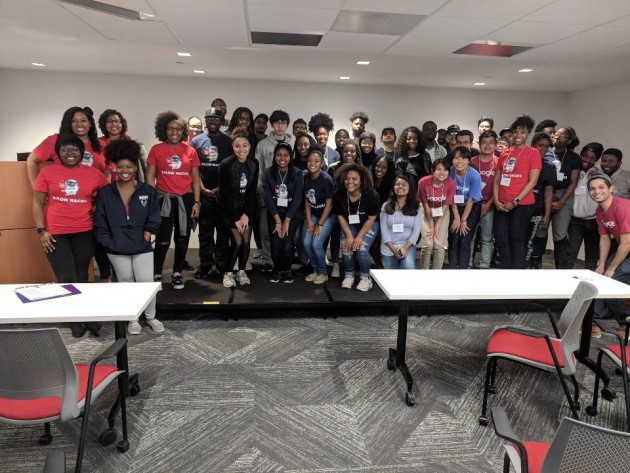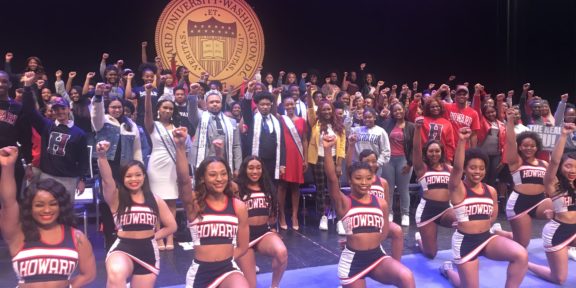“What they used to try to do with black folks in particular, is say ‘Are you black or a journalist first?’ And the answer is: ‘Black. And?'”
Robert E. Pierre is passionate about his job, but more importantly, his people. As editor of The Root DC-the offspring of TheRoot.com and The Washington Post-his job is to adequately and fairly cover local events, services and trends that reflect Washington, D.C.’s African American community.
He has worked at The Washington Postfor nearly two decades, writing about everything from crime to race. In 2010, his first book, “A Day Late and a Dollar Short: High Hopes and Deferred Dreams in Obama’s ‘Post-Racial’ America,” was published. Written with the author Jon Jeter, the book explored the lives of African-Americans from a wide range of backgrounds to further understand how President Obama’s election affected their lives.
Here, he talks signature stories, the joys and pains of journalism, and being and staying black:
Q: Why did you become a journalist?
I was going to major in engineering when I was a junior in high school and my English teacher asked me if I would want to write a column for our local paper. It’s called the Franklin Banner-Tribune, a daily paper in this small town Franklin, La. I started doing it, and everyone wanted to talk to me so they could get their name in the paper so their mamas could see it. So, I was a superstar at school because everybody wanted to get in the paper. I majored in journalism when I went to college.
Q: What do you like most about your job?
You’d get to ask people anything and it’s the most important thing to them, and they tell you. You get to be a student of life, and ask people about geophysics or whatever it is that they do, getting out on the water if you’re interviewing someone that’s going fishing. You get to be a student of the world.
Q: What’s the most difficult thing about your profession?
One thing is figuring out what makes a difference. Sometimes you spend all of your time doing stuff and you’re not sure where it lands – that it mattered. You wonder whether or not it was worth your time to do it. The other is fighting stereotypes and getting across the idea that you get to tell people’s story. I was on this radio program the other day, and someone asked me what was the story that had the most impact. People think about when I flew with Dick Cheney when he and George Bush were running for office. That stuff is cool, but it’s actually going to people’s houses [that mattered more].
I went to this woman’s house. She was probably 28 or 30 years old. Her brother had been killed. He was probably 21 or 22 years old. She pulls out this clipping. The clipping said “A 21-year-old District man was killed” in whatever 100-block and police don’t have a suspect, and that was the end of the brief. It didn’t even say her brother’s name, and it never said her brother’s name because The Postnever printed his name.
While we get jaded sometimes about what this is, she had a clipping from the paper that didn’t even say her brother’s name, but she knew that it was him that had been killed on that block, and that was the only acknowledgment that The Washington Postever made to the fact that he died. You forget sometimes, while you think it’s not important, it’s most of the time the only time anybody ever gets their name in the paper.
Q: What has been the most challenging story or project you’ve worked on?
I go back to the issue of homicides. There was a 12-year-old kid, Darryl Deon Hall, I can’t forget him laying in the casket, because it was like “That’s got to be too young.” He’d shot at somebody in this neighborhood apparently [Benning Heights] and it led to a lot of other stories, but that one was one too many. He was 12 and he was shot in the head, and dumped into a ravine, body frozen and body found at the bottom of a hill. That and a juvenile justice story.
Homicides are the ones that stick because they’re just so problematic. There was this one guy who was dating this woman, he wasn’t the father of her child. I don’t know if the kid was sniffling or whining or something like that. They put some bag over her head, put her in the closet and tied the bag. I guess they’d done this before. Well, she stopped breathing. Then they went back to sit down to eat dinner, and an hour later the girl was dead.
At the trial, it was one of those that was difficult to sit through because you just wanted to punch this dude and kick him in the head until he died, because it was just ridiculous that a grown man, and mother of this kid would allow this guy – whatever, I don’t care what kind [of relationship you have], you killed this kid. And then they put the kid’s body in a dumpster to try to get rid of it. The first line of that story is “I could see her feet” when the mother had come to her senses.
Q: What was one of the best projects?
One of the most gratifying [things] was working on the “Being a Black Man” project. It was started black, written black, edited black, and shot black – mostly – almost all of the decision makers on the project were black. It was us telling our stories.
Q: Is it difficult to cover black topics as a black journalist?
A lot of people think that black folks can’t cover black folks well – that you’re going to make it all nice and neat, and it’s a lie because we can be just as tough on each other as anything else. It’s just that we didn’t recognize ourselves in the stories they told, because all they wanted to focus on was the negativity.
I can take the bad as long as you show me regular. If you tell me a story about my family and you tell me about “Uncle Pookie who is drunk” it’s like “Yeah, he’s drunk, but he also does this for the kids.” We’re both “and” and not “either, or.”
I can quit being a journalist today, but I’m black everyday. So don’t ask me which one I am first because it’s this fake judgment about whether you’re objective or not, and it’s like, “Man, get outta here. I’m black.”
Q: Any advice for aspiring journalists?
Listen. As it relates to storytelling, forget about your questions and listen to what people say and respond to that. Do your research, but listen to what people say. That’s the best thing you can do, and learn how to tell stories. Forget about all of the things you learned in journalism school, just tell somebody a story.
Link to The Root DC: http://www.washingtonpost.com/local/therootdc






